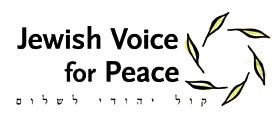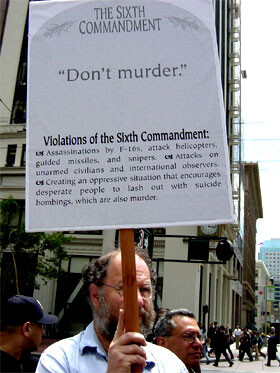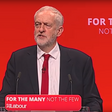The Electronic Intifada 19 February 2004

She cautiously eyes my card, on which I have purposely written in thick, visible letters: Jewish Voice for Peace. “I don’t know, she says. “Do you support the occupation?” It seems such a surreal question. How could anyone support an occupation? The very word evokes domination, a kind of cruelty. No, I say, we want to end the occupation. We want a peace that is just.
I ask about the checkpoints. She describes sitting in her car waiting to be allowed to drive through. The young Israeli soldiers are in sniper posts. You can’t see them, but they can see you, she explains. They signal it’s time to go by shooting their guns. She waits a long time until the soldiers say, “OK, now the dogs can go.”
“You think, ‘Do I want to be called a dog, or do I just want to go?’ ” she tells me. “I don’t care, so I start my car and they yell ‘No! Not you, I said dogs!’ So she turns her car off, and sometime later they say, “OK, now humans can go!” She starts her car and they look at her and the others and say “No! I said humans.” And she turns her car off and waits until finally this “other” category of Palestinian — neither human nor animal — is allowed to pass.
“This,” she says, “is my only contact with Israelis.” And this, I think, and is my first contact with someone from Gaza.
The WSF and the new anti-Semitism
The World Social Forum (WSF) is the populist answer to the World Economic Forum in Davos, Switzerland. Instead of a gathering of the world’s mostly wealthy, white, and male heads of state and captains of industry in Davos, the WSF is a cacophony of anti-globalization/human rights activists from all over the globe.
The roughly 100,000 participants represent every imaginable cause — from Indian “untouchables” and Bhutanese refugees to child trafficking and sexual minorities. They are seen in the hundreds of marches that seem to appear out of nowhere down the main thoroughfare, at the 500 information booths, in more than 1,000 workshops, and on the political posters filling every inch of available wall space.
I have come because my New Voices human rights fellowship has decided to send the fellows to the WSF. But I have an additional reason for being here. The Simon Wiesenthal Center (SWC) has cited the WSF as one of the centers of what it and others refer to as the “new anti-Semitism”, and these charges have been picked up by various journalists as evidence of a dangerous new trend on the left.
Upon closer reading, most of these accounts make little if any distinction at all between anti-Semitism and criticism of Israel, or between anti-Semitism and anti-Zionism. The SWC description of the “anti-Jewish” atmosphere at last year’s WSF in Brazil is one of these accounts.
And yet, their description of the WSF is so disturbing, even frightening, that I am prepared to encounter at minimum silent hostility, and possibly even physical attacks from my fellow attendees. I have come to the WSF to be loudly and visibly Jewish, to make a presentation that deconstructs the theory that Jews dictate U.S. policy in the Middle East, and to see for myself this purported new tidal wave of hatred of Jews from the rest of the global left.
The conference is not what I expected
It is surprising to find that the Israel-Palestine conflict and the occupation are not more prominently featured at the conference. Out of hundreds of ongoing marches, I witness only one small pro-Palestine march, which includes a prominent Israeli leftist marching in the front row.
Out of about 500 information stalls, only two represent Palestinian human rights groups: PENGON, which is working to tear down the wall Israel is building through Palestinian land, and Al-Haq, which is launching a campaign identifying collective punishment as a war crime. Of the thousands of political posters, I see only one series — Al-Haq’s powerful posters on collective punishment — related to the issue.
I attend most of the workshops I can find on the Israel-Palestine issue. What I do not hear (or see) is anything I would consider anti-Semitic. In a global conference of 100,000 people, one expects to hear an enormous range of political perspectives, including the occasional extreme or intolerant remark. Given that I am prepared for the worst, I am shocked that the overwhelming majority of what is said in workshops critical of US and Israeli policies in the territories is milder than the articles and essays one can read in Israeli newspapers on any given day.
Two realities, one anti-Semitism industry
After I return home, the Wiesenthal Center publishes an alarming piece entitled “Networking to Destroy Israel” in the Jerusalem Post. The article claims that this year’s WSF was “hijacked by anti-American and anti-Israeli forces” and leads me to wonder whether we attended the same conference. In this piece, and for the second year in a row, they strangely declare themselves the only Jewish NGO to attend the WSF.(I personally saw participants from Brit Tzedek and Yesh Gvul, to name just a few — and Jewish Voice for Peace is listed in the official program.)
They go on to cite a litany of statements, including mine, as proof that the WSF is a place where people who want to destroy Israel meet to plot and recruit. Employing a form of twisted logic that would make Donald Rumsfeld proud, they essentially claim that the absence of any blatant anti-Semitism is not proof that there was none, but merely an indication of a more “sophisticated” kind of anti-Zionism (and therefore anti-Semitism) in which sympathetic Jews such as Jewish Voice for Peace (JVP) play a starring roll.
The account is so riddled with errors — I am misquoted, JVP is described as “campus-based”, all of my colleagues are given the wrong attributions, and quoted either inaccurately or out of context — that it is pointless to list them all. It contains bits of truth but strings together isolated statements to make them sound like a tidal wave of hatred and part of what they call an “orchestrated” and “insidious” campaign to destroy Israel.
All this begs the question of why a group such as the SWC would want to fuel hysteria about anti-Semitism in general, especially in regard to the left. The SWC has an important history of hunting down former Nazis, exposing the activities of neo-fascists and other right-wing hate groups, and fighting genuine anti-Semitism.
But the SWC is like many other mainstream Jewish organizations in the United States that have expanded their mission from fighting the oppression of Jews by others to attempting to silence critics — including other Jews — of Israel’s human rights record. These organizations’ new role as arbiters of acceptable opinion is a far cry from their proud past. And it is ironic, given the spirited debate about Israel’s occupation that takes place in Israel, but apparently is unacceptable in the rest of the world.
For many of these organizations, as evidenced in the SWC op-ed, the mere mention of the heartbreaking reality of Israel’s occupation of the Palestinians is proof of an insidious plan supported by other Jews to wipe Israel off the face of the earth. Further, it is evidence of bias simply to point out causality-that groups like JVP or Al-Haq exist not because we are anti-Jewish or anti-Israel-but to end the injustices of Israel ‘s occupation and treatment of Arabs, and to stop the spiral of revenge that has become a horrible tragedy for everyone.

A Jewish Voice for Peace demonstration. (JVP)
What is perhaps most troublesome is that by fueling the fires of fear through hyperbolic statements, (an easy thing to do to a people with our history of suffering and persecution) these groups—who say they represent all Jews— play a critical role in giving the current Israeli government permission to violate virtually every moral and ethical standard central to the Jewish tradition in its effort to keep down the Palestinians.
They make peace ever more distant by perpetuating the myth that Jews and Arabs, Israelis and Palestinians, have nothing to say to each other and are incapable of recognizing each other as full human beings with similar wants and needs. They get under our skin and seek to make Jews believe that indeed, the world is out to get us and we can trust no one.
Acts of Lovingkindness at the WSF, the untold story
In my own experience as a very “out” Jew at the conference, I felt no hate. Instead, I met a number of Palestinians and Arabs who, on some fundamental level, expressed the pain of separation. “I am Muslim, and we were raised to respect the Jewish tradition,” a Palestinian woman living in Jordan told me. “We used to live next door to Jews, and we were friends.”
After I spoke at a session about suspending military aid to Israel until it ends its occupation, and identified myself as a member of Jewish Voice for Peace, a Palestinian woman thanked me and a distinguished Lebanese man from Jordan came up and gave me a huge hug and a kiss.
Two of the Arabs that the SWC op-ed quoted most prominently in their description of what they called a campaign to destroy Israel were environmental scientist Rania Masri and activist journalist Ahmed Shawki.
Thirty minutes after meeting me for the first time at the Forum, Ahmed Shawki offered to loan me the new digital camera given to him by his wife. He knew I was eager to take pictures and the airline had misplaced my luggage. Knowing nothing of my politics, only that I was from a Jewish peace group, he gave me his digital camera.
The next day, the bag containing my passport, credit cards, and his camera was stolen. Our mutual friend and colleague from Lebanon, Rania Masri, handed me a hundred dollars from her wallet and absolutely insisted I take her ATM card and PIN number so I would have money for the rest of the trip. And Ahmed? To this day, Ahmed refuses to accept payment for the camera that was stolen.
This is the real story of Jews, Arabs, and the World Social Forum that needs to be told; that is, the ways in which we so quickly and easily recognize each other’s fundamental humanity. As one young Arab-Israeli woman — who will never be quoted in an article about the rising tide of anti-Semitism — said so eloquently and passionately the last night of the conference, “Yes, I experience discrimination in Israel. But my friendship with Jewish Israelis is proof that it is a lie when both sides tell us we can’t live together. We can live together. You must not believe the lie.”
Cecilie Surasky is the Communications Director for Jewish Voice for Peace and a New Voices fellow with the Academy of Educational Development.



